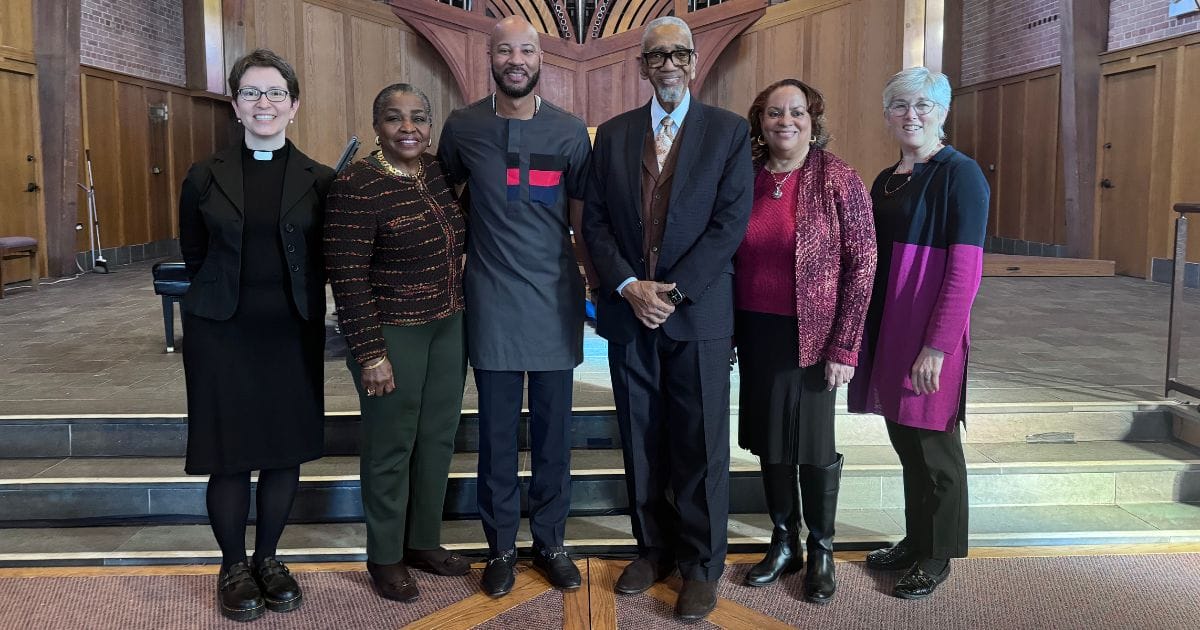PICTURED L TO R: Catherine Healy, Rector, SPR, Jo Ann Roberts, PhD., SPR BHM Chair, Alderman Lamont Robinson, 4th Ward, Congressman Bobby L Rush (ret.), Michelle Duster, Public Historian, Sara Bigger, SPR Anti-racism Working Group.
Public historian Michelle Duster shared little known facts and anecdotal stories about the life, times and uncompromising drive of her great-grandmother the revered civil rights activist and anti- lynching crusader Ida B. Wells during the Black History Month celebration at St. Paul & the Redeemer in Hyde Park.
“Ida B. Wells was not afraid to say ‘NO’. She said “NO” to racism, sexism, segregation and lynching.” Michelle shared how her great-grandmother left the NAACP, which she co-founded because the organization “was not militant enough”; and. how she defied authority to move from the back of the 1913 Women’s Suffrage March to the front and was the only Black woman in the Illinois delegation.
Congressman Bobby L Rush (ret.) shared how nine decades following Ida B. Wells’ death his Emmitt Till Anti-lynching legislation signed into law by President Biden finally fulfilled her demand to make lynching a federal criminal act.
Fourth ward Alderman Lamont Robinson acknowledged how the late sculptor Richard Hunt’s “The Light of Truth” national monument dedicated to Ida B. Wells looms in the heart of the community where she once lived as a source of information, education and inspiration for all to be a ‘light for justice’.
The Reverend Catherine E. Healy, Rector said, “We believe that providing an opportunity to engage in meaningful conversations and hear inspiring stories is crucial in fostering understanding and unity.”
Over 150 parishioners and community members filled the small Episcopal church that has a rich 130-year history with a strong civil rights engagement record. Attendees included the Rev. Dr. Janette Wilson, Operation PUSH, Crystal Plummer, Canon for Networking at the Episcopal Diocese of Chicago and Bill Trusdale, consultant with the Illinois State board of Education.
Concerned about current attempts to remove Black history from schools, Jo Ann Roberts, Ph.D., a career education administrator and SPR BHM Chair reminded all that the first mandatory Black history curriculum in a US public school system was implemented in Chicago Public Schools between 1942 and 1945. Madeline Morgan, developed the curriculum entitled: “The Intellectual Emancipation of the Negro.”
“The founder of Black History Week, Carter G. Woodson inspired by Ida B. Wells, was clear about the need to teach Black history – ‘This crusade is much more important than the anti-lynching movement, because there would be no lynching if it did not start in the schoolroom’,” said Roberts. “Anti-racism must now be taught in the classroom.”
The Episcopal church has a long-standing anti-racism commitment and has achieved recent Black history milestones. Following the George Floyd police murder and subsequent Black Lives Matter movement, Bishop Michael Curry, the first Black U.S. presiding bishop, formed a working group to expand the church’s ongoing anti-racism and reconciliation efforts.
The Chicago Diocese’s first woman and first Black leader, Bishop Paula Clark, introduced Sacred Ground, an eleven- session Episcopal Church program that provides participants with history and perspectives about race and racism in the United States. SPR’s civil rights engagement goes back to the 60’s when it’s, then, rector led the Episcopal Society for Cultural and Racial Unity.
Michelle talked about the values and structures that have traditionally kept the Black community strong underscoring the importance of family, the value of education and having a vested interest in serving the community. Devorah Crable, SPR BHM Co-chair said, “The call to action is for each of us to use our gifts and talents to combat injustice in all forms as ordinary people and citizens.”






